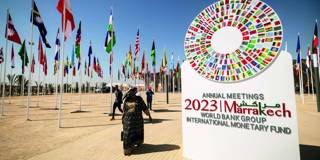Even though the world economy remains beset by challenges, multilateral cooperation appears to be in decline. But by working together to de-escalate geopolitical tensions, prevent technological fragmentation, and mitigate the effects of climate change, the international community could lay the groundwork for a more hopeful future.
JAKARTA – Global leadership was woefully absent in the wake of the COVID-19 crisis, which left no country unscathed. In 2021, I noted that the shape and pace of the post-pandemic economic recovery largely depended on multilateral cooperation. That remains true today, as the global economy, which has yet to bounce back fully from the pandemic, faces a new source of risk: proliferating geopolitical conflicts. Over the last two years, the war in Ukraine, the Israel-Hamas war, and seven military coups in Sub-Saharan Africa have increased fragility and have displaced huge numbers of people.
And yet, despite conditions that require strengthening collective action, multilateral cooperation appears to be in decline. We are not on track to meet the Sustainable Development Goal of ending extreme poverty by 2030; an estimated 7% of the world’s population will still be living in penury, if current trends continue. Moreover, climate disasters are becoming more common – a dangerous and worsening trend. Discouragingly, there is a lack of global leadership in tackling these existential threats to humanity. It would do us well to acknowledge this reality and then decide how to change it.
Even amid overlapping crises, there is good news. The world economy has shown resilience in 2023, despite the slow and uneven recovery since the pandemic. The fight against stubbornly high global inflation seems to be working: inflation is projected to fall steadily from 8.7% in 2022 to 6.9% in 2023 and 5.8% in 2024. This can be attributed to interest-rate hikes and lower international commodity prices, although prolonged monetary tightening will slow global economic activity. Meanwhile, GDP growth in some emerging markets and developing economies, especially in East Asia and the Pacific, has surpassed pre-pandemic levels, with China, Vietnam, and Indonesia among the top performers.

JAKARTA – Global leadership was woefully absent in the wake of the COVID-19 crisis, which left no country unscathed. In 2021, I noted that the shape and pace of the post-pandemic economic recovery largely depended on multilateral cooperation. That remains true today, as the global economy, which has yet to bounce back fully from the pandemic, faces a new source of risk: proliferating geopolitical conflicts. Over the last two years, the war in Ukraine, the Israel-Hamas war, and seven military coups in Sub-Saharan Africa have increased fragility and have displaced huge numbers of people.
And yet, despite conditions that require strengthening collective action, multilateral cooperation appears to be in decline. We are not on track to meet the Sustainable Development Goal of ending extreme poverty by 2030; an estimated 7% of the world’s population will still be living in penury, if current trends continue. Moreover, climate disasters are becoming more common – a dangerous and worsening trend. Discouragingly, there is a lack of global leadership in tackling these existential threats to humanity. It would do us well to acknowledge this reality and then decide how to change it.
Even amid overlapping crises, there is good news. The world economy has shown resilience in 2023, despite the slow and uneven recovery since the pandemic. The fight against stubbornly high global inflation seems to be working: inflation is projected to fall steadily from 8.7% in 2022 to 6.9% in 2023 and 5.8% in 2024. This can be attributed to interest-rate hikes and lower international commodity prices, although prolonged monetary tightening will slow global economic activity. Meanwhile, GDP growth in some emerging markets and developing economies, especially in East Asia and the Pacific, has surpassed pre-pandemic levels, with China, Vietnam, and Indonesia among the top performers.